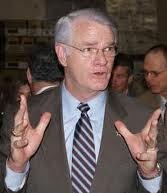For students of history in Memphis and Shelby County, there are few precedents to guide them through the extraordinary synthesis that is about to get underway as Memphis City Schools and Shelby County Schools begin their two-year path toward merger. On October 1, an enlarged interim school board will become official, comprising the MCS board’s current 9 members, the SCS board’s 7, and 7 new members just selected from as many freshly designed districts by the Shelby County Commission.
The new board won’t have its first real meeting until October 3, but the members of that board, as well as those of the equally new 21-member transitional or planning committee created by this year’s Norris-Todd bill to assist the merger, have already had a joint, get-acquainted session.
That kumbaya affair was convened on Thursday at the University of Memphis by Shelby County Mayor Mark Luttrell, one of three ex-officio members of the transitional committee. The other two are MCS Board chairman Martavius Jones and SCS Board chairman David Pickler. Since Jones and Pickler are also members of the interim school board, the actual number of the ensemble gathered Thursday night was 42 — a number suggestive of the Nashville Metro Council and a not unwieldy group, considering the circumstances.
Those circumstances include the separate-but-equal state of mind that was embodied in the very fact of the two soon-to-be consolidated entities — an urban, almost all-black school sysem and an integrated but white-dominated one representing the suburbs. To call their union a shotgun marriage requires re-casting that metaphor, inasmuch as the process began after the 2010 election when representatives of the two systems and their host populations armed themselves for a showdown. The SCS’s Pickler talked out loud of getting the new heavily Republican legislature to sanction a new special school district for the suburbs. And Jones and others on the MCS Board, feared the possible loss of tax revenue to a new county district, responded with their own doomsday scenario — a threat to surrender the city board’s charter so as to force consolidation with SCS.
In the event, the MCS Board followed through and Memphis voters, under the terms of a 1961 Private Act, ratified the prospective dissolution of MCS in a March referendum. Meanwhile, the Norris-Todd bill, named for the two Collierville legislators who introduced it — state Senator Mark Norris and state Representative Curry Todd — had handily passed the General Assembly, mandating a delayed merger, to be accomplished in fall 2013, at which time the suburbs, together or singly, would indeed be granted the opportunity to create one or more special school districts.
So it was that the unity of the Thursday night get-together convened by Russell was somewhat deceptive. One member of the new interim board, broker Chris Caldwell, reported being hot-boxed by two of his new colleagues from SCS, David Reaves and Mike Wissman, who made the case for new breakaway districts when the time came. Indeed, Wissman had just been elected mayor of suburban Arlington, a municipality which has already engaged the consulting group Southern Education Strategies, to help it plot the course toward an independent district. Other municipalities — Germantown, Collierville, Bartlett — are embarked on similar preparations. Bartlett’s mayor Keith McDonald, who was recently named to the transitional committee, has served notice he intends to lead his city into a separate school district, and he makes the case that new county districts are entitled to inherit their present school buildings and other infrastructure cost-free, on the ground that the state-mandated Average Daily Attendance formula had already distributed tax moneys for capital construction on a 3:1 ration favoring the city schools.
That premise is sure to be contested in court, however, but, whether adherents of the city schools achieve full unity or not, they will finally gain the single-source funding status that has eluded them in recent years, when city residents have been assessed both the county general tax for education and a surcharge to help finance the separate city district. That circumstance has been the source of a troublesome sidebar to the Memphis public-education saga. A cash-strapped Memphis City Council shaved $57 million off its maintenance-of-effort obligation to Memphis City Schools in 2008, and when the courts found the City of Memphis liable for the shortage, the Council has been straining ever since to pay its back bill. That’s one good reason why Council members had heartily endorsed the MCS charter surrender, which would ultimately get the city out from under its special obligation. Should the suburbs follow through with their special-district plans, their citizens will be the ones, not Memphis residents, who are saddled with two public-school bills. In a striking irony, the current “city” schools — i.e., those of Memphis — would become the official county schools, while such of the former county schools as formed new municipal districts would become the “city” schools.
Thus, the prevailing apparent unity of the present may be only a veil for a coming separation which will re-establish a demographic division of Shelby Couny’s public schools — but a division which, more clearly than the prior situation, would give each of the two entities a little more of what they have historically wanted. That would be the aforesaid single-source funding for Memphis residents and autonomy (though an expensive variety) for a major portion at least of county residents.
Which is not to say that a more expansive form of consoldaton would be prevented from taking hold. Former exponents of school-district separation, like Pickler himself, are now making public statements suggesting their commitment to build a common future — especially if that future should allow significant independence within the structure of what is being talked up as chancellery system on the model of New York, with considerable autonomy in curricular and administrative matters for the separate parts. In an op-ed last week for the Memphis Flyer, suburban Shelby County Commissioner Heidi Shafer, who had been opposed to school consolidation, endorsed just such a formula.
But there are still pockets of bitterness and intransigence — notably on the County Commission among the three representatives from District Four, Shelby County’s outer suburban rim. Those three — Terry Roland, Wyatt Bunker, and Chris Thomas — have from the beginning of the merger process fought a running guerilla war against the proponents and prospects of consolidation, declining to countenance it in any form.
All the while declaiming their abhorrence of consolidation, the three District Four resisters boycotted or, without apology, tried to subvert the merger process at every turn — refusing to participate in the first round of Commission interviews of prospective interim school board candidates and taking part in the latter stages only to try to insert opponents of merger onto the board. At best, they succeeded only incrementally, subjecting outspokenly pro-merger candidates to hectoring interrogations and, whenever such an applicant was demonstrated to have children in private schools, charges of hypocrisy.
The opponents of merger did claim one prominent scalp, however — that of state Senator Jim Kyle, who had volunteered to serve as an interim representative in District 5 and, especially after indicating he would give preference to his Board function in case of a calendar conflict with simultaneous duties in the legislature, had been expected to glide into the position with minimal fuss. Kyle’s service as state Senate Democratic leader, however made him the focus of an argument by the GOP diehards that his very presence confirmed a Democratic bias on the board. The debate on Kyle drew from Commissioner Wyatt Bunker the strikingly discordant claim that the senator, a former gubernatorial candidate respected on both sides of the aisle in Nashville, was “just a political hack.”
In the end, in what had to be a mortifying outcome for Kyle and his supporters, the senator was edged out on a 7-6 vote of the commission — party-line except for a crossover vote from African American freshman Democrat Justin Ford, who was impressed by the credentials of Kyle’s opponent, a young and evidently sincere black businessman named Kevin Woods, whose political affiliation happened to be Republican.
So the two basic bodies that will guide Memphis and Shelby County schools (or such vestiges of the latter whose municipalities are willing) into educational union are now up and soon to be running — both destined to go out of commission on September 1, 2013, the date set for completed merger by U.S. District Judge Hardy Mays, who had earned universal plaudits for his skill in dealing with assorted litigations from the contending groups. Overcoming some resistance from representatives of state government, Mays had also presided over the development of as Memorandum of Understanding beween the parties, one fruit of which was their agreement to include all members of the current MCS and SCS boards on the interim all-county board.
On September 1, 2013, that provisional 23-member assembly will be replaced by a new seven-member board which will have been elected in August 2012 from the seven agreed-upon Shelby County districts, whose borders, reflecting demographic patterns in the 2010 census, had essentially been dictated by the joint city/county Office of Planning and Development, a politically neutral body. Lori Patterson, a lawyer for the Shelby County Commission, has informed her clients that Judge Mays has indicated an openness to both speeding up the timetable for the new school board to take over and to increasing its membership to 13 if that is the will of the Commission.
As for the 21-member transitional or planning commission, whose highly education-oriented membership was appointed by the two current school boards and County Mayor Luttrell, with single-member add-ins from Governor Haslam, Senate Speaker Ramsey, and House Speaker Harwell, it, too will dissolve on September 1, 2013. Its functions meanwhile are purely advisory, as the interim school board will be calling the shots on the way to merger.
Again, the situation of this highly ad hoc merger of previously polarized entities in Shelby County has few historical precedents. One possible guiding example, however, might be that of the federal union itself, created in 1789 from competing entities with disparate priorities. That one has endured despite awesome threats to its unity. The new Shelby County Schools system should be so lucky.
A somewhat different version of this article appeared in the current issue of the Tennessee Journal.





